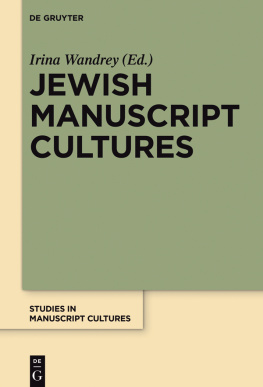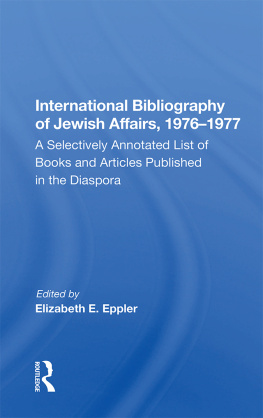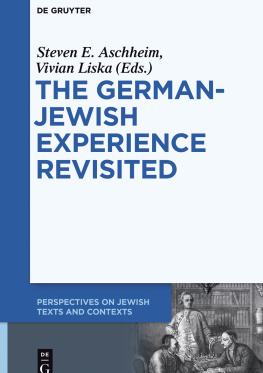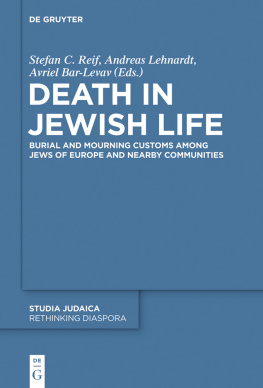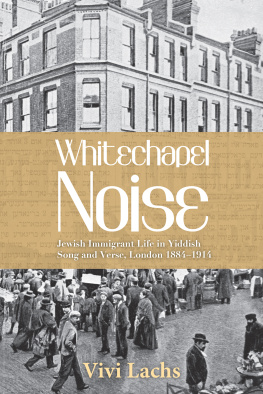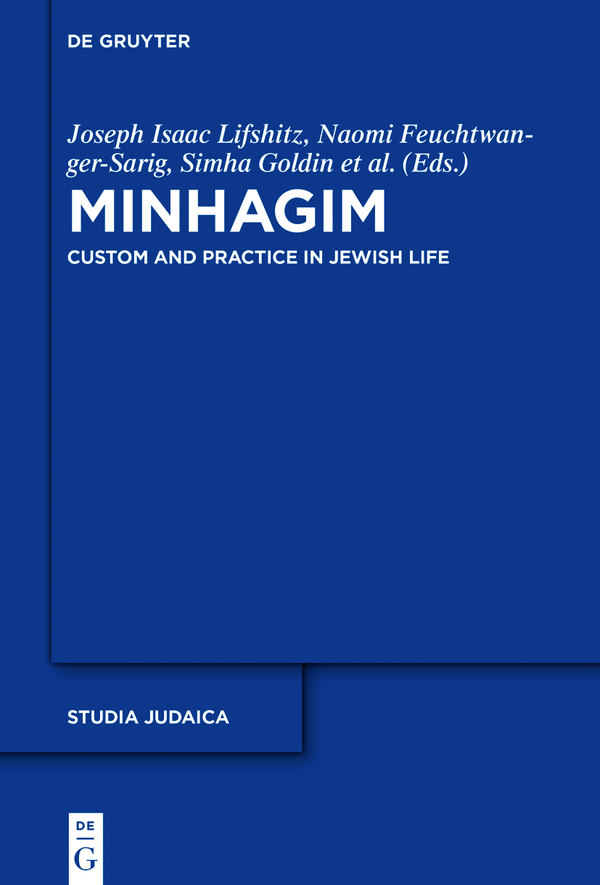Studia Judaica
Forschungen zur Wissenschaft des Judentums
Edited by
Ernst L. Ehrlich
Gnter Stemberger
Charlotte Fonrobert
Elisabeth Hollender
Alexander Samely
Irene Zwiep
Volume
Rethinking Diaspora
Edited by
Stefan C. Reif
Simha Goldin
Andreas Lehnardt
Volume
ISBN 9783110354232
e-ISBN (PDF) 9783110357523
e-ISBN (EPUB) 9783110386653
Bibliographic information published by the Deutsche Nationalbibliothek
The Deutsche Nationalbibliothek lists this publication in the Deutsche Nationalbibliografie; detailed bibliographic data are available on the Internet at http://dnb.dnb.de.
2020 Walter de Gruyter GmbH, Berlin/Boston
Acknowledgements
Judaism is a religion with a strong emphasis on law, and Minhag or custom is one of the most important components of Jewish law. This volume is the fruit of an international conference on Minhagim organized by the Goldstein-Goren Diaspora Research Center of Tel Aviv University (May 1316, 2012), in cooperation with the Goldstein-Goren Center for American Jewish History of New York University, the Goldstein-Goren International Center for Jewish Thought of Ben-Gurion University, the Goldstein-Goren Center for Hebrew Studies at the University of Bucharest, the Centro di Judaica Goren-Goldstein at the Universit degli Studi di Milano, the cole des Hautes tudes en Sciences Sociales, and the Centre de Recherche Franais Jrusalem. The conference included a diverse array of papers from a variety of fields and methodologies of Jewish Studies. We hope that this volume will enrich the discourse and scholarship on Jewish customs.
This book could not have been published without the hard work and dedication of many individuals and institutions. Our deep thanks go to all who have contributed to the completion of this volume: the scholars who took part in the conference, particularly those whose articles grace these pages; the staff at the Goldstein-Goren Diaspora Research Center, especially Ora Azta, Adi Moskovitz, and Sara Appel; the linguistic editor Shirley Zauer; and the editors at De Gruyter for their patience and meticulous work, in particular Albrecht Dhnert, Sophie Wagenhofer, Katrin Mittman, Alice Meroz and Andr Horn.
Details of the Contributors
Lihi Habas is an archaeologist and art historian, teaching at the Institute of Archaeology of the Hebrew University of Jerusalem on various subjects related to the archaeology and art of the ancient, classical, Roman and Byzantine eras. Dr. Habas researches the inter-relationships between architecture, mosaics, furnishings, and ceremonial objects in the Byzantine Empire in general, with particular emphasis on the Holy Land. She researches and publishes findings from archaeological sites in Israel such as the churches of Khirbet ed-Deir, Mt. Berenice, Tel Bet Shean, Gan Yavne, Nahal Qidron, Jerusalem, Ozem, Hazor-Ashdod, Ostrakine in northern Sinai, and many more. She also publishes minor art findings from archaeological sites and museums in Israel. She occasionally curates exhibitions on archaeological themes, as well as modern art and contemporary art, and also serves as advisor for exhibitions.
Simha Goldin is a Professor in the Department of Jewish History at Tel Aviv University, where he also serves as Director of the Goldstein-Goren Diaspora Research Center. He is a social historian whose work primarily focuses on the Jews of Ashkenaz during the Middle Ages. His research examines societal constructs like community, neighborhood, conversion, and the status of women, drawing on a broad range of methodologies and sources to provide greater understanding of the daily lives of medieval Jews and their relationships with the Christian societies among which they dwelt. Prof. Goldin's book on conversion, entitled Apostasy and Jewish Identity in High Middle Ages Northern Europe: Are You Still My Brother?, was published by Manchester University Press.
Ephraim Kanarfogel is the E. Billi Ivry University Professor of Jewish History, Literature and Law at Yeshiva Universitys Bernard Revel Graduate School of Jewish Studies. He has authored or edited eight books and published ninety articles and reviews. His most recent book, The Intellectual History and Rabbinic Culture of Medieval Ashkenaz, won the Goldstein-Goren International Book Award and the Jordan Schnitzer Book Prize from the Association of Jewish Studies. His forthcoming book, Brothers from Afar: Rabbinic Approaches to Apostasy and Reversion in Medieval Europe, will be published by Wayne State University Press in 2019.
Joseph Isaac Lifshitz is a research associate at the Goldstein-Goren Diaspora Research Center at Tel Aviv University and a senior lecturer at Shalem College. His books include: Rabbi Meir of Rothenburg and the Foundation of Jewish Political Thought and One God, Many Images: Dialectical Thought in Hasidei Ashkenaz.
Jean Baumgarten is a director of research emeritus at the Centre de recherches historiques (CRH), Centre National de la Recherche scientifique (CNRS-EHESS, Paris). He wrote articles and books on the Old Yiddish literature, the cultural history of the Ashkenazi world, the history of the Jewish book and the Hasidim. Latest publications: Le Petit monde: le corps humain dans les textes de la tradition juive, de la Bible aux Lumires, Paris, Albin Michel, 2017; La Lgende de Yosef della Reina, activiste messianique, Paris, Editions de lclat, 2018. He is currently working on an edition of the Minhagim (Venice, 1593).
Naomi Feuchtwanger-Sarig is an Adjunct Assistant Professor at Ono Academic College, Jerusalem and Senior Fellow at the Research Centre Dynamics of Jewish Ritual Practices in Pluralistic Contexts from Antiquity to the Present of the Max-Weber-Kolleg fr kultur- und sozialwissenschaftliche Studien, Universitt Erfurt. Her main fields of interest are Jewish material and visual culture, as well as the study of Christian theologian and Hebraist writings on Jewish rites and rituals that shed light on ritual and ceremonial objects, and synagogue architecture and furnishings. She is the author of numerous studies on Jewish art and visual culture. Her book, Thy Fathers Instruction: Reading the Nuremberg Miscellany as Jewish Cultural History, is forthcoming, and she is currently working on the Invention of a Textual and Visual Printed Tradition: The Minhogim Bukh by Shimeon haLevi Gnzburg (Venice: Giovanni di Gara, 1593), in collaboration with Jean Baumgarten of the CNRS-EHESS, Paris.
Noga BarOr-Bing graduated with honors from Hebrew Universitys distinguished Revivim program and received her PhD in Jewish Thought from Ben Gurion University. She specializes in modern Hasidism and gender, researching the many changes within ultra-orthodox communities. She teaches at Hebrew University, the Kerem Teachers Seminary in David Yellin College and the Hartman Institute. Today Dr. BarOr-Bing is a staff member of the Mandel Institutes program for ultra-orthodox women.
Michael J. Broyde is a Professor of Law at Emory University and Projects Director of its Center for the Study of Law and Religion. In the 20182019 academic year he is a visiting professor at Hebrew University School of Law as a Fulbright Senior Scholar.
Ira Bedzow is the Director of the Biomedical Ethics and Humanities Program at New York Medical College and Senior Scholar at the Aspen Center for Social Values. He is the author of numerous books, articles, and chapters on ethics, law, and social values.


